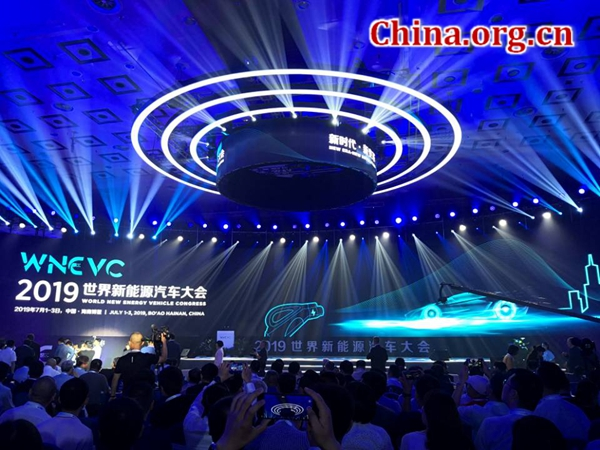
Opening ceremony of the World New Energy Vehicle Congress in Boao, Hainan province on July 2. [Photo by Yuan Fang/China.org.cn]
Electrification, intelligence and shared mobility are transforming the global auto industry with a speed, depth and breadth never seen in over a century, said an official who spoke at Boao in South China's island province of Hainan on Tuesday.
Wan Gang, vice chairman of the National Committee of the Chinese People's Political Consultative Conference and president of the China Association for Science and Technology (CAST), made the remarks in his keynote speech at the World New Energy Vehicle Congress (WNEVC) which ran from July 1 to 3.
The auto industry has been one of the main industries for many countries over the past century, but with the widespread use of internal combustion engine vehicles, problems such as an over-dependence on oil, air pollution, greenhouse gas emissions and traffic jams have emerged. Together they have placed huge pressures on the industry, compelling it to seek energy-saving, low-emission, low-carbon, high-safety-performance, high-convenience-performance and high-efficiency growth, said Wan, who is also president of WNEVC.
Speaking on the area of electrification, Wan said decarbonization, hydrogenation, cleanness and high efficiency represent the trends in the development of energy technology. He added that electricity and hydrogen, both clean and effective energy carriers with multiple sources of supply, can lead to the development of more vehicles that are independent of fossil fuels.
Wan described new energy vehicles (NEV) as a sign of the auto industry's transformation. NEV sales have exceeded 2.14 million units in the world's major markets in 2018, of which 1.26 million were sold in China. This accounted for 4.5 percent of China's new car sales in the same year.
In the area of intelligence, Wan said it is transforming the way vehicles are produced and operated.
The transformation in vehicle operation is demonstrated by intelligent connectivity and autonomous drive. R&D and production are also being transformed through smart manufacturing and the industrial internet, Wan explained, adding that future intelligence will also include interaction with smart cities, transport and energy.
He predicted China's intelligent connectivity and autonomous vehicle technologies will experience rapid development in the next few years as supporting technologies such as 5G, Beidou Navigation Satellite System, sensors and intelligent transport continue to mature.
When discussing the area of shared mobility, which includes time-based rentals, ride hailing and integrated mobility services, Wan said it is also transforming vehicle ownership and usage.
Shared mobility, he said, is convenient and efficient because it complements urban public transport and connects with high-speed rail and air transport. It also provides personal services as well as reduces traffic jams, and is set to gain more urban consumers, especially young consumers thereby changing the way cars are being sold, Wan added.
As China embraces electrification, intelligence and shared mobility, it will also strengthen high-level openness and international cooperation in these three areas, Wan remarked.
In terms of cooperation in the NEV industry, Wan said while China's electric vehicle products have entered scores of countries, foreign electric vehicle makers are also active in the Chinese market.
Telsa has established a wholly-owned NEV enterprise in Shanghai and Mercedes-Benz and BMW are launching electric vehicle joint ventures with Geely and GMW respectively, according to Wan.
Wan believes that the impact of the current transformation goes beyond the auto industry, stressing that China is willing to work with the global auto industry to tackle challenges and redefine the future.
"This transformation, while providing new momentum for the auto industry, also presents historical opportunities to redefine the world's energy landscape, combat climate change and realize a sustainable auto industry," he said.
Ratified by China's State Council and organized by CAST and the People's Government of Hainan, the WNEVC focuses on the transformation of the auto industry and the ecological improvement of the environment. Themed "New Era, New Revolution, New Industry," the event was attended by 1,500 people including representatives from governments as well as international organizations from 18 countries and regions including Germany, the United States and the Republic of Korea. Representatives of Chinese and foreign NEV enterprises including Volkswagen, BWM, Nissan, Changan Auto, SAIC, BAIC and BYD also attended the event.